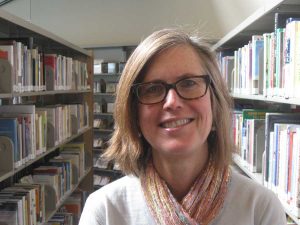 THE FINE ART OF NESTING
THE FINE ART OF NESTING Everyone has a story. Every voice has value. What better time than now to discover yours? We're offering workshops on paper making and kits for bookbinding. ... by Charlie Westerink
Read in Ned | April 13, 2018
by Roberta Brown-Jones
For a second year, Nederland Community Library has hosted a National Science Foundation grant-funded “Science Cafe” book club, which provides selected science-themed books to each participant free of charge. The group reads the book and then participates in a group discussion at the library. These groups are limited to fifteen participants in order to encourage everyone to participate. Gilpin Extension Director Dr. Irene Shonle, who has an extensive ecology background, and Jay Mann co-moderate these sessions and help to provide an informed context for the books.
This year, the group chose four books to discuss. I decided to take on the last one: Sapiens: A Brief History of Humankind by Yuval Noah Harari. This weighty tome was first published in Israel in Hebrew in 2011 and was so popular that it was published in English and numerous other languages in 2014. Harari, a tenured history professor at the Hebrew University of Jerusalem, was able to take an astounding amount of information and distill it into a book that is both informative and very readable for lay people.
Harari covers far too much information to try to distill in a short review, but there were a few ideas posited in Sapiens that I found make me look at the world a bit differently now. One is that we as a species would not have moved forward and become the dominant species (for better and worse) had we not developed the ability to create fictions. Some of the examples he uses are the constructs of nation, religion, money, corporations, laws, and human rights. All of these common elements of modern societies seem like objective realities to many of us, but he correctly points out that they all work merely because we have collectively decided to believe in them.
Going further with this idea, Harari deconstructs our idea of gender and points out the differences between the biology of male and female versus the cultural mythology of the appropriate roles for males and females. He effectively points to the stability, so far, of the biological markers for male and female and contrasts those with the changes in cultural expectations for each, which are still a work in progress.
Harari divides the book into four main sections based on events which he believes had the biggest effect on our historical trajectory to current times. They are the three revolutions that caused the greatest changes: the Cognitive, Agricultural, and Scientific Revolutions. In addition, he has a section on the unification of humankind. In it, he argues that if we take the long view across millenia, humankind is ultimately on a slow march toward global unity. He uses this framework to effectively explain the progression of human capabilities and analyze both the positive and negative aspects of each.
Harari has noted that he was influenced early on by Jared Diamond, another great thinker who has explored human evolution and societies in great depth in books such as Collapse and Guns Germs and Steel. For those of you who decide you’d like additional reading after Harari’s book, I’d highly recommend Diamond’s work as well. In addition, Harari followed up Sapiens with another book, Homo Deus, which concentrates on humanity’s future and our quest for humans to become godlike.
Although Harari’s book covers some rather weighty topics, he manages to present his information with wit and humor which makes the reading even more pleasurable. We can also look forward to his next book 21 Lessons for the 21st Century, which is slated to come out in August 2018. Promotional materials for the book promise that it will cover world issues that include terrorism, fake news and immigration as well as topics that affect people more individually such as resilience, humility, and meditation.
The NSF two-year grant for the Science Cafe program has ended, but participants from the book club are talking about finding ways to continue the program in future years with other funding, including participants possibly self-funding book purchases. So, stay tuned.
 Roberta Brown-Jones is a Library Assistant at the Nederland Community Library.
Roberta Brown-Jones is a Library Assistant at the Nederland Community Library.